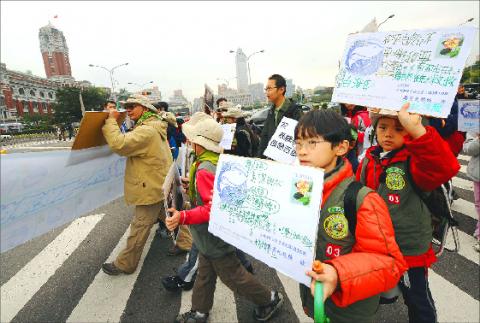Relocating the development project for Kuokuang Petrochemical Technology Co’s proposed eighth naphtha cracker overseas could be an option amid opposition to constructing the plant in Taiwan, Minister of Economic Affairs Shih Yen-shiang (施顏祥) said yesterday.
On a visit to Academia Sinica, Shih said that from an economic point of view, major development projects such as naphtha crackers should be built in Taiwan, but added that the government would not oppose relocating such projects overseas if the environmental cost was “too heavy to bear.”
“The government will not proceed with Kuokuang’s naphtha cracking project without the passage of an environmental impact assessment,” Shih said.

Photo: CNA
Shih made the remarks in response to questions by Chou Chang-hung (周昌弘), an Academia Sinica specialist in plant ecology and phytochemical ecology.
Chou said the proposed eighth naphtha cracker, as well as the operational sixth naphtha cracker in Mailiao Township (麥寮), Yunlin County, run counter to the government’s policies on energy-saving and reducing carbon dioxide emissions.
Chou said the sixth cracker had damaged land, air and water resources in areas near the plant.
Building a new cracker in Changhua County would cause further damage, with the proposed plant expected to account for 25 percent of the nation’s carbon dioxide emissions when operational, Chou said.
In related news, representatives of environmental protection and wildlife conservation groups accompanied 20 schoolchildren to the Presidential Office yesterday to deliver postcards to President Ma Ying-jeou (馬英九) asking him to protect Taiwan’s indigenous pink dolphins, which are facing extinction.
The proposed location of Kuokuang’s cracker is a 200-hectare stretch of wetland at the estuary of the Jhuoshuei River (濁水溪), which also forms part of the habitat of the pink dolphins, whose population is believed to number fewer than 100.

Taiwan is to commence mass production of the Tien Kung (天弓, “Sky Bow”) III, IV and V missiles by the second quarter of this year if the legislature approves the government’s NT$1.25 trillion (US$39.78 billion) special defense budget, an official said yesterday. Commenting on condition of anonymity, a defense official with knowledge of the matter said that the advanced systems are expected to provide crucial capabilities against ballistic and cruise missiles for the proposed “T-Dome,” an advanced, multi-layered air defense network. The Tien Kung III is an air defense missile with a maximum interception altitude of 35km. The Tien Kung IV and V

The disruption of 941 flights in and out of Taiwan due to China’s large-scale military exercises was no accident, but rather the result of a “quasi-blockade” used to simulate creating the air and sea routes needed for an amphibious landing, a military expert said. The disruptions occurred on Tuesday and lasted about 10 hours as China conducted live-fire drills in the Taiwan Strait. The Civil Aviation Administration (CAA) said the exercises affected 857 international flights and 84 domestic flights, affecting more than 100,000 travelers. Su Tzu-yun (蘇紫雲), a research fellow at the government-sponsored Institute for National Defense and Security Research, said the air

A strong continental cold air mass is to bring pollutants to Taiwan from tomorrow, the Ministry of Environment said today, as it issued an “orange” air quality alert for most of the country. All of Taiwan except for Hualien and Taitung counties is to be under an “orange” air quality alert tomorrow, indicating air quality that is unhealthy for sensitive groups. In China, areas from Shandong to Shanghai have been enveloped in haze since Saturday, the ministry said in a news release. Yesterday, hourly concentrations of PM2.5 in these areas ranged from 65 to 160 micrograms per cubic meter (mg/m³), and pollutants were

Taiwan’s armed forces have established response protocols for a wide range of sudden contingencies, including the “Wan Chun Plan” to protect the head of state, the Ministry of Defense (MND) said today. After US President Donald Trump on Saturday launched a series of airstrikes in Venezuela and kidnapped Venezuelan President Nicolas Maduro, concerns have been raised as to whether China would launch a similar “decapitation strike” on Taiwan. The armed forces regularly coordinate with relevant agencies and practice drills to ensure preparedness for a wide range of scenarios, Vice Minister of National Defense Hsu Szu-chien (徐斯儉) told reporters before a